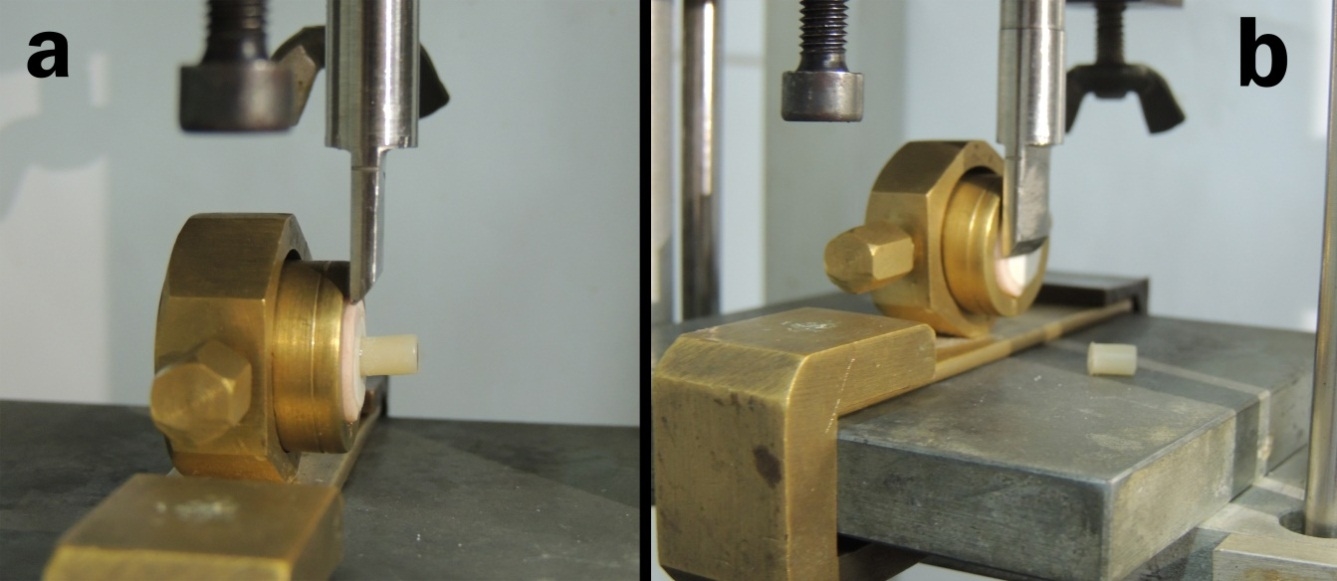IADR Abstract Archives
BONDING OF MODIFIED POLYETHERKETONEKETONE TO ITS RESIN VENEERING AND DENTIN
Objectives: To evaluate shear bond strength (SBS) of modified Polyetherketoneketone known as High-performance polymers (BioHPP) CAD/CAM with its CAD/CAM veneering composite (breCAM.HIPC) using two different dual-hardening adhesives, as well as to dentin using two different cements.
Methods: For Group I, twenty BioHPP discs with their digital veneering with breCAM.HIPC were milled. BioHPP discs were sandblasted with 110 μm alumina oxide and divided randomly into two subgroups (n=10) according to the adhesive used. Subgroup IA: using DTK adhesive. Subgroup IB: using Combo.lign.
For Group II, twenty CAD/CAM BioHPP discs were milled, sandblasted with 50 μm alumina oxide and divided into two subgroups (n=10) according to cement used to lute to dentin surface. Subgroup IIA: using: RelyX Unicem resin cement, subgroup IIB: using Fuji Plus GI cement.
After water storage, thermally cycled (1200 cycles, 5°C/55°C), all specimens were subjected to shear force until failure and the results were statistically analyzed. Modes of failure were assessed.
Results: Mean SBS were as follows: DTK adhesive: 6.24MPa, combo.lign: 2.42MPa, RelyX Unicem: 2.07MPa and Fuji Plus: 3.77MPa. Mann-Whitney test demonstrated significant differences between the two subgroups in groups I and II (U= 2.0, P=.001) (U=17, P=.013) respectively. Stereomicroscope revealed mixed and adhesive failures were most dominant.
Conclusions: MDP-Containing Self-adhesive Resin (DTK adhesive) is recommended as efficient adhesive to increase SBS of veneering composite to BioHPP. Also Fuji Plus showed better SBS than RelyX with BioHPP and dentin.
Methods: For Group I, twenty BioHPP discs with their digital veneering with breCAM.HIPC were milled. BioHPP discs were sandblasted with 110 μm alumina oxide and divided randomly into two subgroups (n=10) according to the adhesive used. Subgroup IA: using DTK adhesive. Subgroup IB: using Combo.lign.
For Group II, twenty CAD/CAM BioHPP discs were milled, sandblasted with 50 μm alumina oxide and divided into two subgroups (n=10) according to cement used to lute to dentin surface. Subgroup IIA: using: RelyX Unicem resin cement, subgroup IIB: using Fuji Plus GI cement.
After water storage, thermally cycled (1200 cycles, 5°C/55°C), all specimens were subjected to shear force until failure and the results were statistically analyzed. Modes of failure were assessed.
Results: Mean SBS were as follows: DTK adhesive: 6.24MPa, combo.lign: 2.42MPa, RelyX Unicem: 2.07MPa and Fuji Plus: 3.77MPa. Mann-Whitney test demonstrated significant differences between the two subgroups in groups I and II (U= 2.0, P=.001) (U=17, P=.013) respectively. Stereomicroscope revealed mixed and adhesive failures were most dominant.
Conclusions: MDP-Containing Self-adhesive Resin (DTK adhesive) is recommended as efficient adhesive to increase SBS of veneering composite to BioHPP. Also Fuji Plus showed better SBS than RelyX with BioHPP and dentin.

